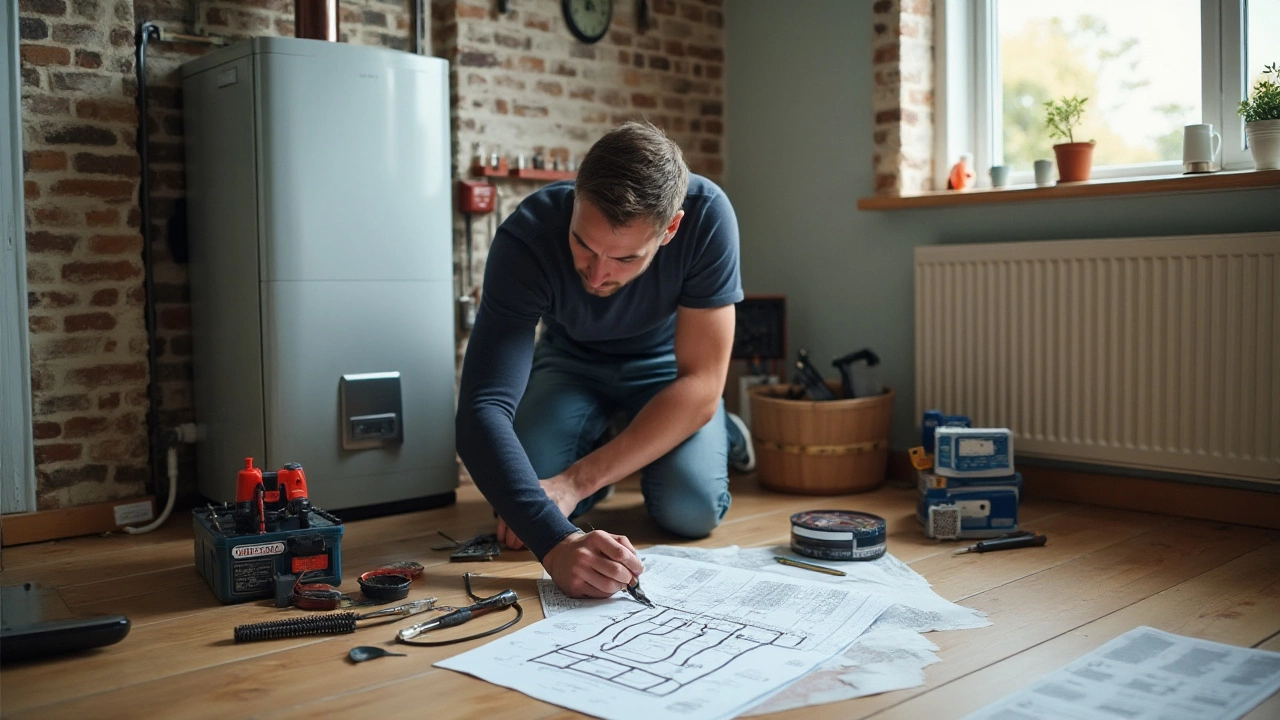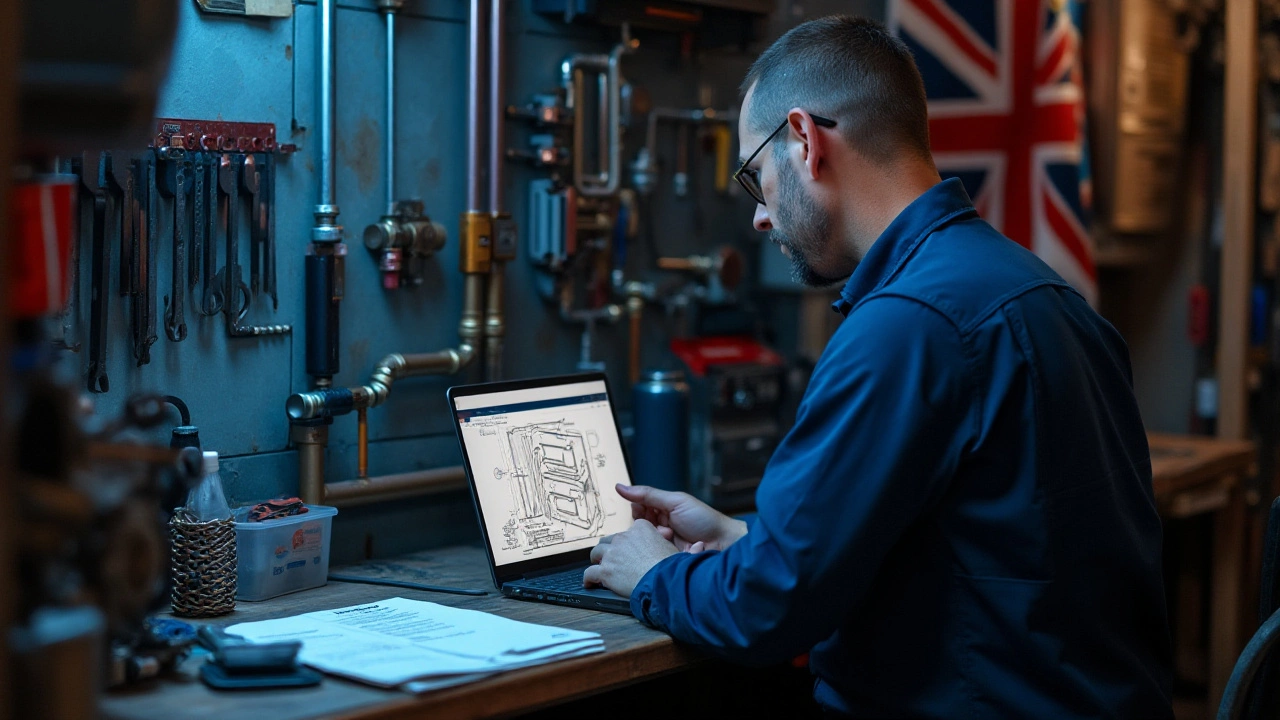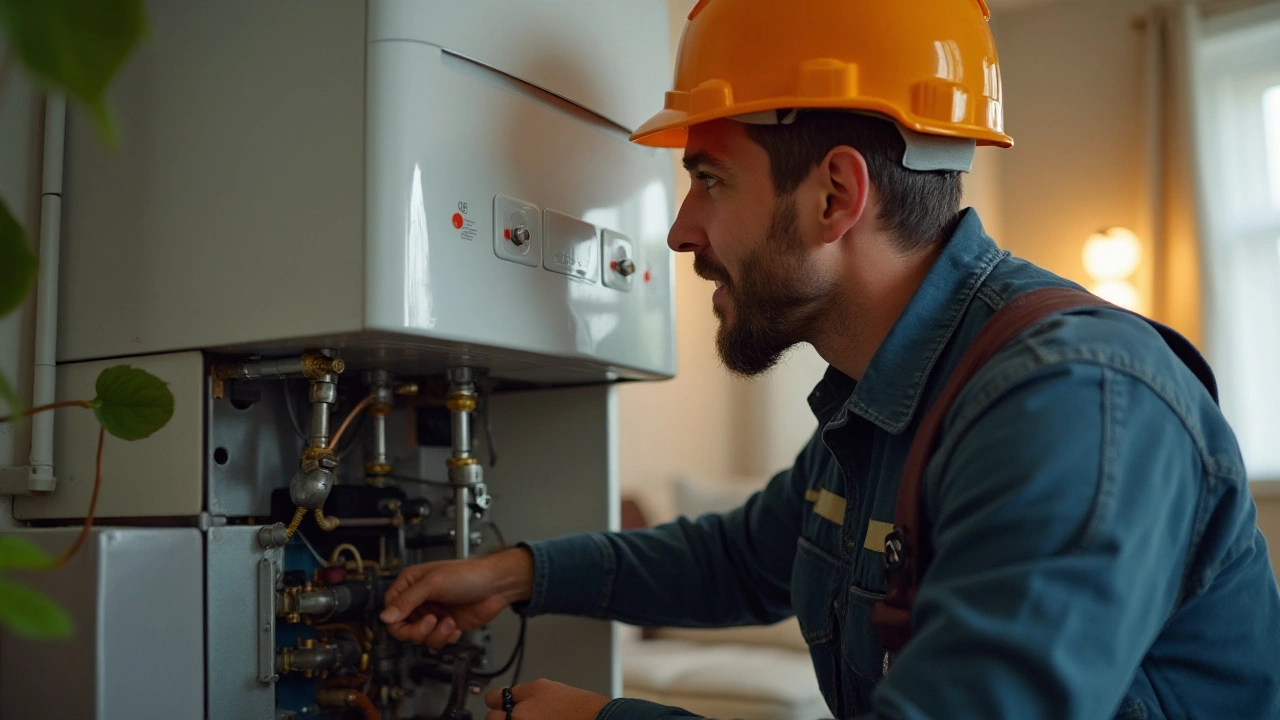When your boiler suddenly stops working on a cold winter’s night, comfort and safety become your top priorities. But who are the unsung heroes whose expertise ensures your heating system is back up and running?
Boiler technicians are the skilled professionals whose understanding of pipes, burners, and thermostats keep homes warm. They possess a unique blend of technical knowledge and practical problem-solving skills. This article will uncover what makes a boiler technician so essential, and how their skills extend beyond the toolbox. Whether you are considering this as a career or just grateful for their service, it's worth understanding what goes on behind the scenes.
- The Role of a Boiler Technician
- Essential Skills for Boiler Repair
- Tools of the Trade
- Traits of a Successful Technician
- Tips for Choosing the Right Professional
The Role of a Boiler Technician
Boiler technicians are the behind-the-scenes wizards who understand the intricate dance of mechanics, heat, and water. Not only do they rescue homes from icy temperatures, but they also ensure the safety and efficiency of boiler repair systems. At the core of their role is a profound knowledge of heating systems, from basic residential units to complex industrial boilers. They become intimately familiar with the broad spectrum of boiler types, including gas, electric, and oil-fueled systems. Their work demands an eye for detail, as they meticulously scour heating systems to identify signs of wear and potential future failures.
A technician's skill set is not limited to tinkering with hardware; they must also possess a strong understanding of regulatory standards and safety procedures. Every adjustment or repair must comply with local and national safety codes, ensuring that the heating system operates within the strict boundaries of safety. This commitment to safety is paramount, as a small oversight in a boiler system can lead to catastrophic failures. Their mission includes regular maintenance inspections, which help prevent potential breakdowns and extend the lifespan of the system.
In addition to technical expertise, boiler technicians must have excellent problem-solving abilities. When a system fails, often without warning, the technician is tasked with diagnosing the issue swiftly and effectively. This requires not only a sharp understanding of schematics and manuals but also analytical thinking. Technicians use advanced diagnostic tools to pinpoint the problem, whether it's a faulty circuit board or a malfunctioning valve. By solving these puzzles, they deliver the warmth and comfort that homeowners expect, allowing life to proceed smoothly.
"The job of a boiler technician is not just about fixing broken systems; it's about restoring comfort and ensuring safety," says John Taylor, a seasoned expert in the HVAC industry.
The modern boiler technician often employs the latest technology to aid in their tasks. This might include using digital inspection scopes to peek into hard-to-reach places or utilizing combustion analyzers to ensure efficient fuel usage. Keeping abreast of technological advancements in heating systems is crucial for each technician's role in this constantly evolving field. So, the ability to learn and adapt is essential, making continuous education a vital part of their career.
Beyond the technical, there's also a deeply human aspect to the role of a boiler technician. Building trust with clients is key, and this means communicating effectively. Technicians need to articulate the nature of the problem and the solution in a way that's understandable to those who might not have any technical background. This communication is not only reassuring but essential for maintaining customer confidence. As such, a successful boiler technician is as much about people as they are about pipes and thermostats. So, when you next find warmth sweeping through your home, perhaps take a moment to appreciate the technical knowledge, skill, and dedication that brings such comfort to life.
Essential Skills for Boiler Repair
Boiler repair is not just about twisting a wrench or replacing a faulty part; it requires a deep understanding of complex systems and the ability to diagnose and resolve issues swiftly. A proficient boiler technician must have a solid grasp of mechanical skills, as heating systems can be intricate with various components needing precise handling. Every piece, from the boiler itself to the network of pipes, valves, and thermostats, needs meticulous attention to ensure efficiency and safety. This attention to detail separates a knowledgeable technician from an average repairman.
Understanding HVAC systems and their interconnected components is crucial for anyone in the boiler repair field. Knowledge of fluid dynamics, thermodynamics, and even basic electrical circuits is beneficial. These skills, coupled with a strong foundation in boiler repair practices, help technicians identify problems that may not be immediately visible. An unbalanced system, for example, can create undue pressure, potentially leading to bigger complications like leaks or even full system breakdowns.
Apart from technical prowess, strong analytical skills and logical thinking are imperative. When a technician examines a boiler fault, they must consider various factors, such as age, usage, and previous repair history of the unit. This analytical approach allows technicians to pinpoint issues quickly and recommend effective solutions. “Diagnosing a heating issue is much like detective work,” says Greg Morton, an HVAC industry expert.
“You need to piece together different clues to get to the root of the problem.”This investigative mindset is invaluable in ensuring a comprehensive repair process.
Problem-solving skills are at the heart of boiler repair. Every malfunction is a puzzle that needs solving, and oftentimes, there are multiple ways to approach a solution. Technicians must weigh different methods, considering cost, time, and the durability of repair options. Creativity often comes into play when devising solutions, especially when parts are scarce or outdated boilers are involved. Knowledge of the latest trends in boiler technology and environmental regulations also plays a critical role in the modern technician’s toolkit.
Effective communication and customer service skills are also essential. Technicians need to explain complex technical matters in simple terms to help customers understand the issue and the suggested remedy. Good communication builds trust, which is key for customer satisfaction. Going beyond just fixing boilers, technicians often take on an educational role, guiding customers on maintaining their boilers for longevity and efficiency. This relationship underscores the importance of having a well-rounded skill set in boiler repair, incorporating both technical expertise and personal interaction.

Tools of the Trade
When it comes to taming the complex beast that is a boiler, boiler technicians rely on a host of specialized tools designed to make their jobs both effective and efficient. These professionals need more than just a basic screwdriver and wrench. Their toolkits are like a treasure trove of gadgets specifically adapted to manage the multitude of potential issues that boilers can present. Understanding the importance and functions of these tools can give us a greater appreciation for the meticulous work involved in boiler repair.
Perhaps most crucial in their toolkit is the pressure gauge. This essential device allows a technician to measure the pressure within the boiler's systems with pinpoint accuracy. Precise pressure regulation is vital; too high or too low, and the system can become unstable, leading to failure. Another indispensable tool is the flue gas analyzer. It may look like a modest handheld gadget, but it’s used for measuring the gases emitted by a boiler. By understanding these emissions, technicians can ensure a boiler is operating efficiently and safely. This device plays a significant role in diagnosing issues related to combustion, which can affect both performance and safety.
Digital multimeters are present in every boiler technician's toolkit. These handy instruments measure electrical currents, voltage, and resistance within the boiler’s circuits. With modern boilers teeming with electrical components, a multimeter is the key to deciphering numerous electrical issues that might arise. Another essential is the pipe wrench, although it might seem basic. This tool allows technicians to tackle the tight spaces and heavy-duty connections that are often part of boiler installations, aiding in the assembly and disassembly of pipe networks.
"In the heart of every boiler technician's toolkit lies a core belief: understanding the machinery is half the battle; the other half is having the right tools for the job," says Robert Ashton, a heating systems consultant with three decades of experience.
The manifold gauge set cannot be overlooked. It's crucial for systems involving refrigeration and can assist in checking the pressures in the cooling cycles, making it especially relevant to technicians who deal with HVAC systems. Additionally, safety gear is paramount. When dealing with high-pressure systems and potentially hazardous gases, technicians must wear protective gear, including gloves and goggles, to safeguard themselves against accidents.
An often underestimated tool is software. Today’s boilers can be as much about software as hardware. Technicians may employ diagnostic software to interface with modern boilers that come equipped with computer chips, allowing for detailed analysis and troubleshooting. This software enables them to diagnose problems that would have been inscrutable in previous generations of boilers. Equipped with these essential tools and many more, boiler technicians can tackle the challenges posed by today’s complex heating systems efficiently and ensure your home stays warm and safe.
Traits of a Successful Technician
Every profession has its own set of skills and traits that determine the success of those who practice it, and boiler repair is no different. To begin with, a successful boiler technician needs a solid foundation of technical skills. This includes understanding the workings of different heating systems and the ability to diagnose and repair various malfunctions. A keen attention to detail is crucial, as overlooking even the smallest problem can lead to larger issues down the track. But it isn’t just about fixing the problem; a successful technician will also have the foresight to anticipate potential future issues, thus preventing future breakdowns.
Aside from technical acumen, effective communication skills are another vital trait of a successful boiler technician. Being able to explain complex mechanical problems in layman's terms is essential, especially when advising homeowners about potential repairs or upgrades. This extends to offering maintenance tips, which can save clients time and money in the long run. When a customer feels informed, they’re more likely to trust the technician’s expertise and recommendations. Patience also comes into play here, especially in situations where clients are distressed about a lack of heat.
Another key trait is adaptability. Not every job will present the same challenges, and a good technician is one who can think on their feet. Whether it’s an unexpected issue with a boiler component or a complex installation in a confined space, flexibility and problem-solving skills are what set apart superior technicians from the average. This ability to adapt also encompasses staying up-to-date with the latest technologies in the industry. As boilers and HVAC systems evolve, so too must the skills of those who maintain them. Not surprisingly, industry statistics highlight that technicians who regularly update their skills see a marked increase in job satisfaction and customer loyalty.
Professionalism rounds out the list of traits necessary for success in boiler repair. This involves more than punctuality and positive customer interactions; it extends to a commitment to continuous learning and adherence to safety protocols. Respect for safety is paramount, both for the technician and the home they’re working in. According to a study conducted by the National Association of HVAC Contractors, rigorous safety standards and precise workmanship have been shown to directly correlate with reduced incidents in the field.
"A technician who balances finesse with tech-savviness will not only earn more jobs but will also establish a reputation as a trusted provider in the community." — John L. Fairbanks, CEO of Heating Excellence Agency
In summary, the most successful boiler technicians are those who combine their technical know-how with strong interpersonal skills, adaptability, and a professional demeanor. By embodying these traits, they not only fix boilers but also provide peace of mind to homeowners—a service that is as invaluable as the warmth they restore.

Tips for Choosing the Right Professional
When it comes to selecting the right person to handle your boiler repair, the process can feel a bit daunting. After all, you are entrusting them with a complex system that’s pivotal in providing warmth and comfort to your home. Start by checking their credentials. Look for certifications like Gas Safe Register in the UK or relevant HVAC licenses in your area, which indicate they have undergone rigorous training. Verification of these credentials ensures the technician is qualified to work safely and effectively on your heating system. Additionally, a track record of ongoing education and certification updates can be a positive indicator that the professional is up to date with the latest technologies and safety standards.
Another essential consideration is experience. While newer technicians might come with the latest knowledge fresh from training, there's irreplaceable value in years of hands-on troubleshooting. Ask about the technician's experience with your specific boiler model or brand, as different systems might require specialized skills. Word of mouth and online reviews can be invaluable; they shed light on customer satisfaction and provide insight into the technician's reliability and professionalism. A technician who comes highly recommended by friends or family is often a safer bet. As stated famously by an industry expert,
“Reputation is often the best certification a technician can have.”Look for consistently positive feedback on communication, punctuality, and effectiveness in solving problems.
Don’t underestimate the importance of the first interaction. Pay attention to how the technician answers your initial phone inquiries. Are they patient, providing clear and comprehensive answers? This interaction can reflect on their approach to service. Transcending technical skills, a good boiler technician should have strong communication skills and the ability to explain the work they will perform in a way you can understand. Request detailed estimates before work begins; transparency in pricing is crucial in preventing unexpected costs. A reliable technician should be able to outline what each cost entails and any potential additional expenses.
Also, understanding the mechanics of a heating system, the use of proper tools cannot be overstated. Inquire if the professional has the necessary tools for the job, as well as if they are equipped to source any uncommon parts specific to your heating system, as required. Sometimes, it is the simple things that make a difference, such as arriving with a well-stocked van. Ask if they offer guarantees or warranties on their work, as these can provide peace of mind about the long-term functionality of your heating system. Additionally, see if they follow up post-repair to ensure everything is functioning correctly, demonstrating their commitment to service excellence.
Ultimately, selecting a boiler technician involves weighing several factors and trusting your instincts. It’s about striking a balance between qualifications, customer feedback, service transparency, and that reassuring gut feeling that you've chosen someone who values both your home and your comfort. By putting in the extra effort to choose the right professional, you ensure not just a quick fix, but a long-term partnership with someone who helps maintain a warm and cozy home environment.
